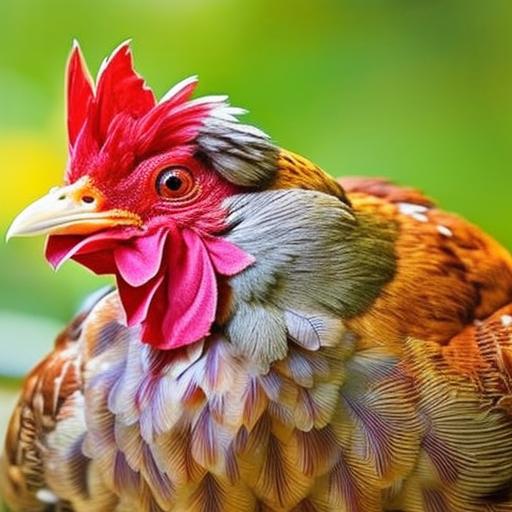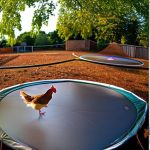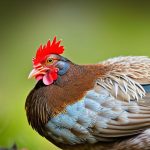Keeping chickens cool during hot weather is crucial for their health and well-being. Chickens are sensitive to high temperatures and can suffer from heat stress, which can have negative effects on their overall health and productivity. Fortunately, there are several ways to keep chickens cool and comfortable during hot weather, including providing shade, offering plenty of fresh water, incorporating cooling foods into their diet, utilizing misters and fans, creating a dust bath area, and adjusting their daily routine.
Key Takeaways
- Keeping chickens cool is important for their health and well-being.
- Signs of heat stress in chickens include panting, lethargy, and decreased egg production.
- Providing ample shade and choosing the right coop can help keep chickens cool.
- Offering fresh water, hydration, and cooling foods can also help prevent heat stress.
- Utilizing misters, fans, and dust baths can further lower temperatures and keep chickens comfortable.
Understanding the Importance of Keeping Your Chickens Cool
Heat stress can have detrimental effects on chickens. When chickens are exposed to high temperatures for extended periods of time, they can experience a range of health issues. Heat stress can lead to decreased egg production, poor egg quality, reduced feed intake, weight loss, and even death in severe cases. It can also weaken the immune system of chickens, making them more susceptible to diseases and infections.
Keeping chickens cool is important not only for their physical health but also for their mental well-being. Chickens are more likely to become stressed and agitated in hot weather, which can lead to aggressive behavior and pecking. By providing a cool and comfortable environment for your flock, you can help them stay calm and content.
Identifying Signs of Heat Stress in Chickens
It’s important to be able to identify the signs of heat stress in chickens so that you can take immediate action to cool them down. Some common signs of heat stress in chickens include panting, open-mouthed breathing, wings held away from the body, lethargy, reduced activity levels, decreased feed intake, and pale combs and wattles.
To identify these signs, observe your flock regularly during hot weather. Look for any changes in their behavior or appearance that may indicate heat stress. If you notice any of these signs, it’s important to take immediate action to cool your chickens down and prevent further heat-related issues.
Providing Ample Shade for Your Flock
| Metrics | Description |
|---|---|
| Number of Shade Structures | The total number of shade structures available for your flock. |
| Shade Coverage Area | The total area covered by the shade structures in square feet. |
| Shade Material | The type of material used for the shade structures (e.g. fabric, metal, wood). |
| Shade Placement | The location of the shade structures in relation to the flock’s living area. |
| Shade Maintenance | The frequency and type of maintenance performed on the shade structures. |
Providing ample shade is one of the most effective ways to keep chickens cool during hot weather. Shade helps to reduce the temperature in the chicken coop or run and provides a comfortable space for chickens to escape the heat. It’s important to ensure that there is enough shade available for all the chickens in your flock.
You can provide shade by planting trees or installing shade cloth over the chicken coop or run. Make sure that the shade is well-ventilated to allow for air circulation. You can also use umbrellas or tarps to create additional shade in specific areas of the coop or run. It’s important to regularly check and adjust the shade as the sun moves throughout the day to ensure that your chickens have access to shade at all times.
Choosing the Right Type of Coop for Hot Climates
Choosing the right type of coop is essential for keeping chickens cool in hot climates. There are several types of coops that are suitable for hot weather, including open-air coops, mobile coops, and hoop coops.
Open-air coops are designed to maximize ventilation and airflow. They typically have large windows or mesh panels that allow for air circulation while still providing protection from predators. Mobile coops, also known as chicken tractors, are designed to be moved around the yard, allowing chickens to access fresh grass and shade throughout the day. Hoop coops are lightweight structures made from PVC pipes and covered with a tarp or shade cloth. They provide ample ventilation and can be easily moved to different areas of the yard.
Offering Plenty of Fresh Water and Hydration

Hydration is crucial for chickens during hot weather. Chickens need access to plenty of fresh water to stay cool and hydrated. Make sure that there are multiple water sources available in the chicken coop or run, especially during hot weather.
Provide water in shallow containers or troughs that are easily accessible to chickens. It’s important to regularly check and refill the water containers to ensure that there is always fresh water available. You can also add ice cubes to the water containers to help keep the water cool.
Incorporating Cooling Foods into Your Chickens’ Diet
Incorporating cooling foods into your chickens’ diet can help them stay cool from the inside out. Some cooling foods that you can offer to your flock include watermelon, cucumbers, lettuce, and other leafy greens. These foods have high water content and can help hydrate chickens.
You can offer these cooling foods as treats or mix them into their regular feed. Make sure to wash the fruits and vegetables thoroughly before feeding them to your chickens. Avoid giving them spoiled or moldy food, as it can make them sick.
Utilizing Misters and Fans to Lower Temperatures
Misters and fans are effective tools for lowering temperatures in the chicken coop or run. Misters spray a fine mist of water into the air, which helps to cool down the surrounding area. Fans help to circulate air and create a breeze, which can make chickens feel more comfortable.
Place misters and fans strategically in the chicken coop or run to maximize their effectiveness. Make sure that they are positioned in a way that allows for optimal airflow and coverage. It’s important to regularly check and clean misters and fans to ensure that they are working properly.
Creating a Dust Bath Area for Natural Cooling
Creating a dust bath area for your flock is not only important for their hygiene but also for natural cooling. Dust bathing is a natural behavior for chickens, and it helps them regulate their body temperature by removing excess oils and parasites from their feathers.
To create a dust bath area, choose a dry and sandy spot in the chicken coop or run. Dig a shallow hole and fill it with sand or fine dirt. You can also add diatomaceous earth to the dust bath area, as it helps to control parasites. Make sure that the dust bath area is easily accessible to your chickens and regularly replenish the sand or dirt as needed.
Adjusting Your Chickens’ Daily Routine for Hot Weather
Adjusting your chickens’ daily routine is important during hot weather to help them stay cool and comfortable. Consider making the following adjustments:
– Change feeding times: Feed your chickens early in the morning or late in the evening when temperatures are cooler.
– Provide shade during free-ranging: If you allow your chickens to free-range, make sure that there is ample shade available for them to seek refuge from the sun.
– Limit activity during the hottest part of the day: Encourage your chickens to rest and stay in shaded areas during the hottest part of the day.
– Avoid handling chickens during extreme heat: Handling chickens can cause additional stress during hot weather, so it’s best to avoid unnecessary handling.
Monitoring Your Flock’s Health and Well-Being During Heat Waves
Monitoring your flock’s health and well-being during heat waves is crucial to ensure that they are coping well with the hot weather. Keep a close eye on your chickens and look out for any signs of heat stress or other health issues.
Check their combs and wattles regularly to ensure that they are a healthy color. Monitor their behavior and activity levels, and make note of any changes. If you notice any signs of heat stress or other health issues, take immediate action to cool them down and seek veterinary advice if necessary.
Keeping chickens cool during hot weather is essential for their health and well-being. By providing ample shade, offering plenty of fresh water, incorporating cooling foods into their diet, utilizing misters and fans, creating a dust bath area, adjusting their daily routine, and monitoring their health and well-being, you can help your flock stay cool and comfortable during hot weather. Implement these tips to ensure that your chickens thrive even in the hottest of temperatures.
If you’re looking for ways to keep your chickens cool during the hot summer months, you’ll definitely want to check out this article on poultrywizard.com. It provides valuable tips and advice on how to create a comfortable and cool environment for your feathered friends. From proper ventilation and shade to using misters and frozen treats, this article covers everything you need to know to ensure your chickens stay cool and healthy all summer long. Don’t miss out on this helpful resource!
FAQs
What temperature is too hot for chickens?
Chickens can start to experience heat stress at temperatures above 85°F (29°C).
What are the signs of heat stress in chickens?
Signs of heat stress in chickens include panting, lethargy, loss of appetite, decreased egg production, and even death.
How can I keep my chickens cool?
You can keep your chickens cool by providing shade, plenty of fresh water, and good ventilation in their coop. You can also give them frozen treats or add electrolytes to their water to help them stay hydrated.
What kind of shade is best for chickens?
Natural shade from trees or shrubs is ideal, but you can also provide artificial shade with tarps or umbrellas. Just make sure the shade covers the entire area where the chickens spend their time.
How often should I change my chickens’ water in hot weather?
You should change your chickens’ water at least once a day in hot weather, and more often if it becomes dirty or contaminated.
Can I use a fan to cool my chickens?
Yes, you can use a fan to help circulate air and keep your chickens cool. Just make sure the fan is placed in a safe location where the chickens can’t reach it or get injured by it.
What should I do if my chickens show signs of heat stress?
If your chickens show signs of heat stress, move them to a cooler location immediately and provide them with fresh water. You can also try misting them with cool water or placing frozen water bottles in their coop to help lower the temperature. If their condition doesn’t improve, contact a veterinarian for further advice.
Meet Walter, the feathered-friend fanatic of Florida! Nestled in the sunshine state, Walter struts through life with his feathered companions, clucking his way to happiness. With a coop that’s fancier than a five-star hotel, he’s the Don Juan of the chicken world. When he’s not teaching his hens to do the cha-cha, you’ll find him in a heated debate with his prized rooster, Sir Clucks-a-Lot. Walter’s poultry passion is no yolk; he’s the sunny-side-up guy you never knew you needed in your flock of friends!







